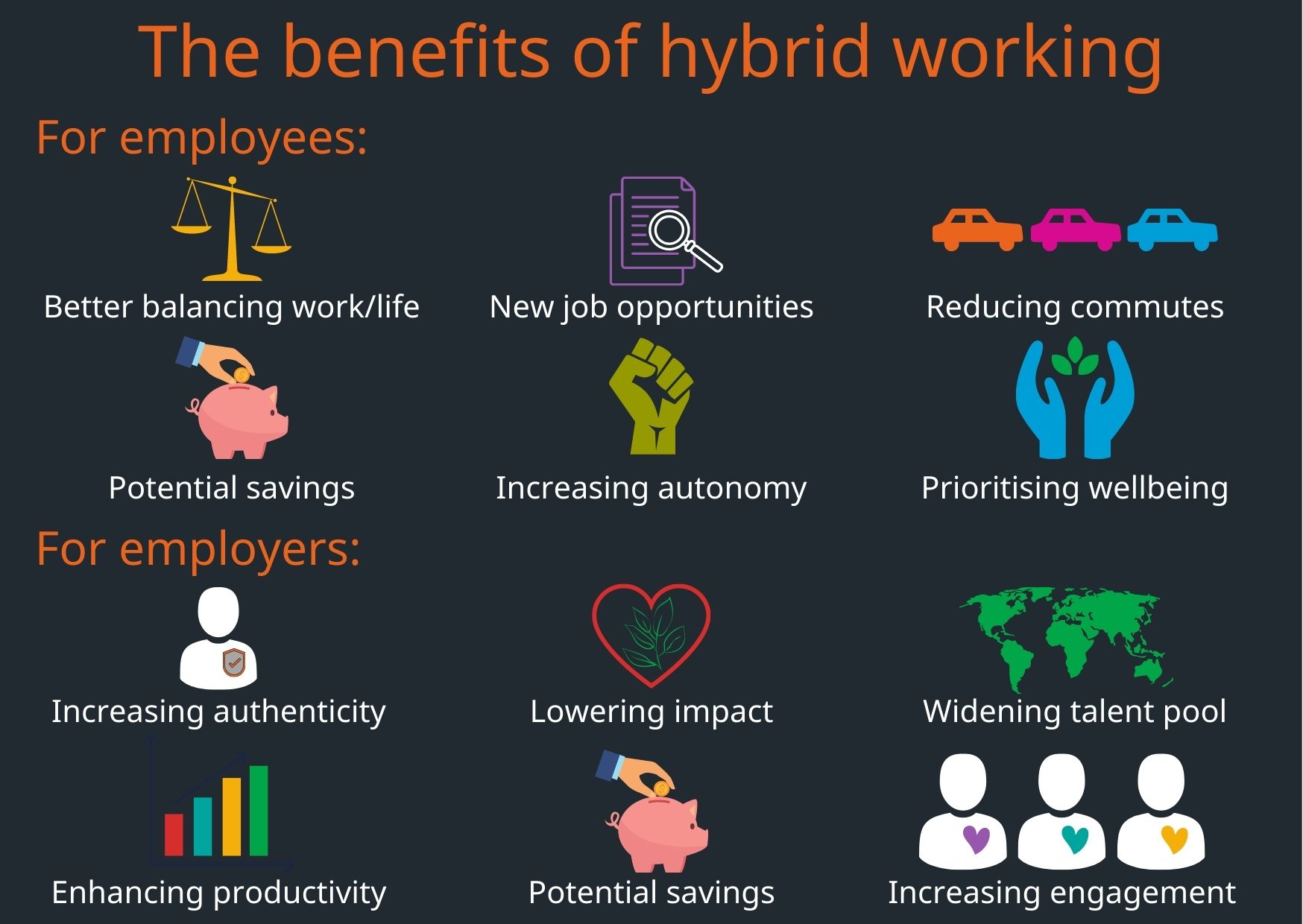The Benefits of Hybrid Working
Hybrid working has become increasingly popular in recent years, especially with the advancements in technology that allow employees to work remotely while still maintaining a connection to their workplace. In this article, we will explore the numerous advantages of hybrid working and how it can positively impact both employees and businesses.
Increased Flexibility
One of the key benefits of hybrid working is the increased flexibility it offers to employees. By allowing individuals to work from home or choose their work hours, hybrid working provides a better work-life balance. Employees can schedule their work around personal commitments, resulting in reduced stress and increased job satisfaction.
Improved Productivity
Contrary to what some may believe, hybrid working can enhance productivity. When employees have the freedom to work in an environment that suits them best, they are more likely to be motivated and focused. Additionally, the absence of daily commutes can save valuable time, allowing employees to dedicate more hours to their work.
Cost Savings
Hybrid working can also lead to significant cost savings for both employees and businesses. With remote work, employees can eliminate commuting costs, such as transportation expenses and parking fees. Employers can save on office space and associated overheads, resulting in reduced operational costs.
Increased Job Satisfaction and Retention
Offering hybrid working options can greatly contribute to employee satisfaction and retention. Employees who have the flexibility to balance work and personal life are more likely to feel valued and motivated. This, in turn, leads to higher engagement and lower turnover rates, benefiting the overall success of the organization.
Enhanced Work-Life Balance
Hybrid working allows individuals to strike a better balance between their professional and personal lives. By eliminating the need for a daily commute and offering flexible working hours, employees can allocate more time to their families, hobbies, and personal well-being. This balance can result in improved mental health and overall happiness.
Collaboration and Communication
While hybrid working may involve physical separation, it does not hinder collaboration and communication. With the help of various digital tools and platforms, employees can easily connect and collaborate with their colleagues, regardless of their physical location. This promotes teamwork and ensures that projects and tasks are completed efficiently.
Reduced Environmental Impact
Another significant advantage of hybrid working is its positive impact on the environment. With fewer employees commuting to the office, there is a decrease in carbon emissions and traffic congestion. This contributes to a greener and more sustainable future, aligning with corporate social responsibility goals.

Hybrid working offers numerous benefits to both employees and businesses. From increased flexibility and productivity to cost savings and improved work-life balance, the advantages are undeniable. Embracing hybrid working can create a positive and thriving work environment, leading to enhanced employee satisfaction, retention, and overall success for organizations.
Frequently Asked Questions about the Benefits of Hybrid Working
1. What is hybrid working?
Hybrid working refers to a work arrangement that allows employees to split their time between working remotely and working from a physical office location.
2. What are the benefits of hybrid working?
The benefits of hybrid working include increased flexibility, improved work-life balance, reduced commuting time, and enhanced productivity.
3. How does hybrid working improve flexibility?
Hybrid working allows employees to choose when and where they work, providing them with the flexibility to adapt their schedules to personal needs or preferences.
4. Does hybrid working improve work-life balance?
Yes, hybrid working can improve work-life balance by giving employees the ability to manage personal responsibilities more effectively while still meeting work obligations.
5. Can hybrid working reduce commuting time?
Indeed, hybrid working can significantly reduce commuting time as employees have the option to work from home or choose non-peak hours to travel to the office.
6. How does hybrid working enhance productivity?
Hybrid working eliminates distractions commonly found in the office environment, allowing employees to focus on tasks and work in a setting that suits their productivity preferences.
7. Are there any downsides to hybrid working?
While hybrid working offers numerous benefits, some potential downsides include the need for effective communication and collaboration tools, potential feelings of isolation, and the challenge of maintaining work boundaries.
8. Can all jobs be done through hybrid working?
While certain roles may require physical presence or specific equipment, many jobs can be performed effectively through hybrid working arrangements, especially with the advancements in remote collaboration technology.
9. Does hybrid working promote employee well-being?
Yes, hybrid working can promote employee well-being by reducing stress related to commuting, providing a better work-life balance, and allowing employees to work in environments where they feel most comfortable and productive.
10. How can companies implement hybrid working?
Companies can implement hybrid working by establishing clear policies and guidelines, providing the necessary technology and tools for remote work, and fostering a culture of trust and communication among employees.




